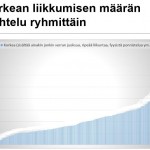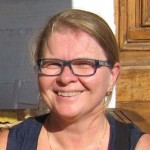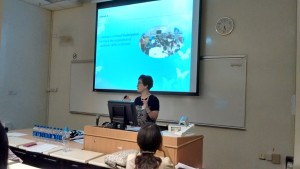Orientation project participates in Tekes Challenge Finland -competition. Challenge Finland is a competition that is seeking commercialisable solutions to major problems. The aim of the competition is to effectively combine top Finnish research with private-sector R&D. Entry is open to Finnish top researchers and companies that want to improve the world. Because Early Childhood is the best place to work for better and more sustainable future, this competition is tailored for us. We presented our project in Finlandia Hall 29th February. The presentation slides (in Finnish) are here. More info about the competition is available here.
Progressive feedback
Our 2015 data collection has been successful. Even in international comparison the project is unique. We have made more than 100,000 observations and we will merge children’s data, learning environment observations etc. with this data to get a full-bodied picture of ECEC. Now we seek to tighten the progressive feedback into a real-time feedback system. This means that we are attempting to change the cycle of data collection over the past five years to a continuous and established feedback for development. We are attempting to work out the details with the municipalities during the spring of 2016. By using careful sampling and online servers we plan to follow real-time changes. Our purpose is to tighten the integration between planning and evaluation to facilitate data-driven decisions.
Online progressive feedback in ECE
 In a meeting with the participating municipalities in Finland 3rd December in Vantaa, we discussed about the needs and interests to enhance ECE in each municipality. The municipalities situation, resources and interests are versatile. Our task is to integrate these interests to deepen the online developmental feedback. The purpose is 1) to enhance municipalities’ possibilities to get essential feedback and impact its collection, 2) to enhance the tools and possibilities for online progressive feedback, 3) to connect the feedback with ECE development and 4) to steer ECE development based on valid and real-time understanding. In December 2015 the municipalities get a proposition for the practical issues of feedback. In the next meeting 26th February 2016 we go through the questions and propositions evoked by the proposition. We aim to make the decision about starting progressive feedback in April 2016.
In a meeting with the participating municipalities in Finland 3rd December in Vantaa, we discussed about the needs and interests to enhance ECE in each municipality. The municipalities situation, resources and interests are versatile. Our task is to integrate these interests to deepen the online developmental feedback. The purpose is 1) to enhance municipalities’ possibilities to get essential feedback and impact its collection, 2) to enhance the tools and possibilities for online progressive feedback, 3) to connect the feedback with ECE development and 4) to steer ECE development based on valid and real-time understanding. In December 2015 the municipalities get a proposition for the practical issues of feedback. In the next meeting 26th February 2016 we go through the questions and propositions evoked by the proposition. We aim to make the decision about starting progressive feedback in April 2016.
Just as an example, we can keep up with the variety of children’ mean physical activity in different groups (see the figure above) and study the effects of different enhancements.
Research instruments
We have used several different instruments in our data collection. Several of them we have produced by ourselves (the observation instrument includes involvement scale developed by Laevers 1994). According to the principles of open access we provide them for viewing for the research community. However, the copyright of the instruments belongs to Orientation project, which is directed by Jyrki Reunamo. If you are interested to use the instruments in your research, please contact Jyrki Reunamo at the University of Helsinki.
- Observation by systematic sampling
- Child evaluation
- Learning environment evaluation
- Leadership evaluation
In addition to the instruments described above, we have used tests for reading and writing readiness, math skills, creativity, balance skills, motor skills, stress level testing (cortisol and alpha amylasis) and physical activity monitoring with Polar activity monitors. The original instruments of Observation and Child Evaluation were developed in 1997 (see Reunamo 2007). They were further developed with the help of the Taiwanese team (especially Hui-Chun Lee, Li-Chen Wang and Rosalind Wu, see https://blogs.helsinki.fi/orientate/taiwanese-team/). The original learning environment was developed in 2004 based on the City of Helsinki data (thank to Seppo Sarras) and enhanced during several rounds of quality evaluation with the help of the municipality participants (especially Merja Kivistö, Helena Nurmi, Taija Pölkki, Heli Söderqvist, Kati Timo, Merja Hietala, Marita Käyhkö, Petra Salomaa and Vesa Joronen) between years 2010-2015. The Leadership evaluation was developed in 2014 with the help of Marja-Liisa Akselin and Ulla Soukainen (thank you for Timo Järvensivu).
Leadership scholarship for Ulla Soukainen
 The Finnish Work Environment Fund has applied Ulla Soukainen (Ph.D., service maneger in early childhood education in Turku) a scholarship of 5000 euro for the analysis of Orientation project data. The main idea of the analysis is to study leadership relating to the basic tasks of early childhood education. The scholarship makes possible to utilize the large and versatile data collected in relation to leadership. The work of the daycare center director has direct connections with children’s everyday experiences, their perceived skills and learning environment. The scholarship also helps to give the directors better feedback on the found connections. Congratulations to Ulla!
The Finnish Work Environment Fund has applied Ulla Soukainen (Ph.D., service maneger in early childhood education in Turku) a scholarship of 5000 euro for the analysis of Orientation project data. The main idea of the analysis is to study leadership relating to the basic tasks of early childhood education. The scholarship makes possible to utilize the large and versatile data collected in relation to leadership. The work of the daycare center director has direct connections with children’s everyday experiences, their perceived skills and learning environment. The scholarship also helps to give the directors better feedback on the found connections. Congratulations to Ulla!
T
Funding for Pedagogical documentation
 Kati Rintakorpi has received a grant from the Ebeneser-foundation (Siiri Valli’s grant) for 8000 euro for the finishing touches of her dissertation. Kati studies the benefits and challenges of pedagogical documentation in early years. Her last dissertation article is based on Orientation project data. How is pedagogical documentation connected with the everyday activities of the children? What are the connections to the learning environment? What kind of skills and tendencies does pedagogical documentation relate to? Congratulations to Kati!
Kati Rintakorpi has received a grant from the Ebeneser-foundation (Siiri Valli’s grant) for 8000 euro for the finishing touches of her dissertation. Kati studies the benefits and challenges of pedagogical documentation in early years. Her last dissertation article is based on Orientation project data. How is pedagogical documentation connected with the everyday activities of the children? What are the connections to the learning environment? What kind of skills and tendencies does pedagogical documentation relate to? Congratulations to Kati!
Bullying and learning
Our article based on Orientation project data has been accepted for publication in the series Contemporary Perspectives in Early Childhood Education http://www.infoagepub.com/series/Contemporary-Perspectives-in-Early-Childhood-Education. The series is globally perhaps the most important yearbook on Early Childhood Education. The publication is a major recognition of the work we are doing in our project. In the article we study bullying from the perspective of learning, which is a new opening in the study of bullying. Learning often helps to process bullying, but in can also result in confrontation, withdrawness or attempt to accept the bullying as a fact. It is also possible that the child learns nothing in the bullying situation, which means that nothing changes. Luckily, as children grow, the bullied child gets perspective and agency to process the situation, but unfortunately some children face a dead end. Article info: Reunamo, J., Ko, J., Cheng, D., Lee, H-C., Wang, L-C. & Salminen, E. (In print). Openness and agency as strategies on addressing bullying. In O. Saracho (Ed.) Contemporary research on bullying in early childhood education. IAP Publishing: USA.
The 2015 Finnish data collection succesful
The Finnish data collection for 2015 ended at 28 May. The data consists of observations, child evaluations, gross motor tests, language skills tests, mathematics skills tests, creativity tests, physical activity measurement with activity sensors, learning environment evaluations and daycare center director evaluations. Data input and merging is underway. The data is huge, but of good quality. For example, the data includes 71 319 observations in 13 categories, which means that there are 927 147 systematically sampled observations of children’s activity in Finnish daycare from January to May 2015. The feedback for the educators, municipalities and directors starts at 17 August 2015.
QCCI conference
At the 2015 Quality Childhood Conference International (QCCI) at 19th June in Hong Kong, an Orientation project symposium was organized. Presenters from Hong Kong, Finland and Taiwan described the project results. In the picture conference chair Doris Cheng presents the differences in children’s orientations at play-based and academic preschools in Hong Kong. The presentations were:
- Reunamo, J. T.: Orientation project: Studying the impact of children’s views in early years
- Lee, H-C., Wang, L-C. & Shih, S-C. Involvement of child learning- Empirical findings in Finland and Taiwan
- Cheng, D. Orientation Project on children’s Views
- Ko, J. Orientation projects in Hong Kong (2) – Does social orientation affect children’s school readiness?
- Chen, H-H. Scaffolded play and learning
- Julienne Pek: Orientation project in Singapore
The conference was also a great place for networking and synchronization of the project. Special thanks for Doris Cheng for the opportunity.
Routledge: Read This Year’s Most Read Articles!
Routledge provides five of the most read Early Years articles for free. In the journal Early Child Development and Care our article Children’s Creativity in Day Care (Reunamo, Lee, Wang, Ruokonen, Nikkola & Malmström, 2014) is among these articles. Read the article here.
